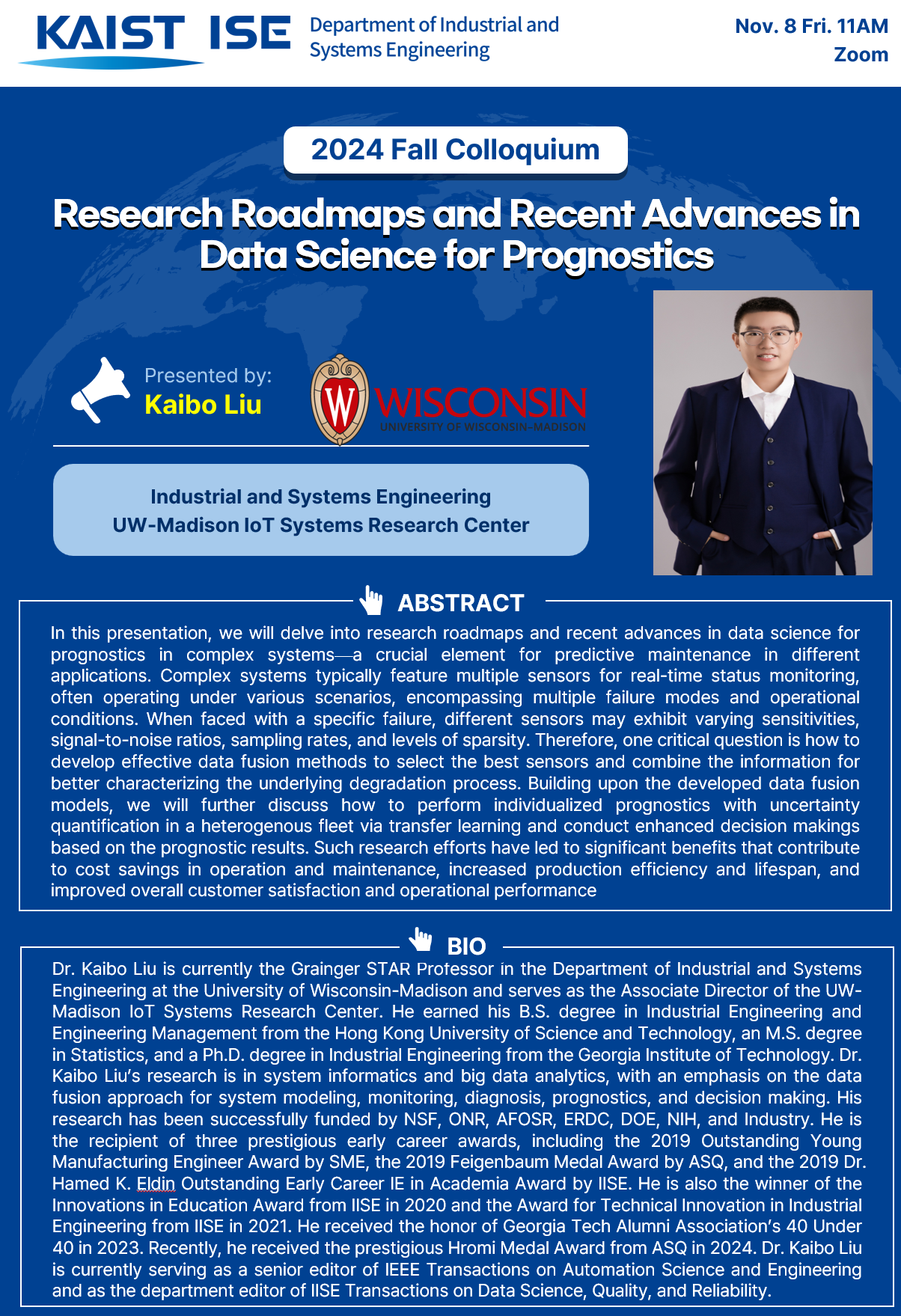뉴스 및 공지사항
- 관리자
- 2024.11.04
- 191
In this presentation, we will delve into research roadmaps and recent advances in data science for prognostics in complex systems—a crucial element for predictive maintenance in different applications. Complex systems typically feature multiple sensors for real-time status monitoring, often operating under various scenarios, encompassing multiple failure modes and operational conditions. When faced with a specific failure, different sensors may exhibit varying sensitivities, signal-to-noise ratios, sampling rates, and levels of sparsity. Therefore, one critical question is how to develop effective data fusion methods to select the best sensors and combine the information for better characterizing the underlying degradation process. Building upon the developed data fusion models, we will further discuss how to perform individualized prognostics with uncertainty quantification in a heterogenous fleet via transfer learning and conduct enhanced decision makings based on the prognostic results. Such research efforts have led to significant benefits that contribute to cost savings in operation and maintenance, increased production efficiency and lifespan, and improved overall customer satisfaction and operational performance.
#Bio :
Dr. Kaibo Liu is currently the Grainger STAR Professor in the Department of Industrial and Systems Engineering at the University of Wisconsin-Madison and serves as the Associate Director of the UW-Madison IoT Systems Research Center. He earned his B.S. degree in Industrial Engineering and Engineering Management from the Hong Kong University of Science and Technology, an M.S. degree in Statistics, and a Ph.D. degree in Industrial Engineering from the Georgia Institute of Technology. Dr. Kaibo Liu’s research is in system informatics and big data analytics, with an emphasis on the data fusion approach for system modeling, monitoring, diagnosis, prognostics, and decision making. His research has been successfully funded by NSF, ONR, AFOSR, ERDC, DOE, NIH, and Industry. He is the recipient of three prestigious early career awards, including the 2019 Outstanding Young Manufacturing Engineer Award by SME, the 2019 Feigenbaum Medal Award by ASQ, and the 2019 Dr. Hamed K. Eldin Outstanding Early Career IE in Academia Award by IISE. He is also the winner of the Innovations in Education Award from IISE in 2020 and the Award for Technical Innovation in Industrial Engineering from IISE in 2021. He received the honor of Georgia Tech Alumni Association’s 40 Under 40 in 2023. Recently, he received the prestigious Hromi Medal Award from ASQ in 2024. Dr. Kaibo Liu is currently serving as a senior editor of IEEE Transactions on Automation Science and Engineering and as the department editor of IISE Transactions on Data Science, Quality, and Reliability.
-----------------------------------------------------------------------------------------------------------------------------------------------------------------------
# Location: Zoom https://kaist.zoom.us/j/82217529529
# Presenter: prof. Kaibo Liu, University of Wiconsin Madison
In this presentation, we will delve into research roadmaps and recent advances in data science for prognostics in complex systems—a crucial element for predictive maintenance in different applications. Complex systems typically feature multiple sensors for real-time status monitoring, often operating under various scenarios, encompassing multiple failure modes and operational conditions. When faced with a specific failure, different sensors may exhibit varying sensitivities, signal-to-noise ratios, sampling rates, and levels of sparsity. Therefore, one critical question is how to develop effective data fusion methods to select the best sensors and combine the information for better characterizing the underlying degradation process. Building upon the developed data fusion models, we will further discuss how to perform individualized prognostics with uncertainty quantification in a heterogenous fleet via transfer learning and conduct enhanced decision makings based on the prognostic results. Such research efforts have led to significant benefits that contribute to cost savings in operation and maintenance, increased production efficiency and lifespan, and improved overall customer satisfaction and operational performance.
#Bio :
Dr. Kaibo Liu is currently the Grainger STAR Professor in the Department of Industrial and Systems Engineering at the University of Wisconsin-Madison and serves as the Associate Director of the UW-Madison IoT Systems Research Center. He earned his B.S. degree in Industrial Engineering and Engineering Management from the Hong Kong University of Science and Technology, an M.S. degree in Statistics, and a Ph.D. degree in Industrial Engineering from the Georgia Institute of Technology. Dr. Kaibo Liu’s research is in system informatics and big data analytics, with an emphasis on the data fusion approach for system modeling, monitoring, diagnosis, prognostics, and decision making. His research has been successfully funded by NSF, ONR, AFOSR, ERDC, DOE, NIH, and Industry. He is the recipient of three prestigious early career awards, including the 2019 Outstanding Young Manufacturing Engineer Award by SME, the 2019 Feigenbaum Medal Award by ASQ, and the 2019 Dr. Hamed K. Eldin Outstanding Early Career IE in Academia Award by IISE. He is also the winner of the Innovations in Education Award from IISE in 2020 and the Award for Technical Innovation in Industrial Engineering from IISE in 2021. He received the honor of Georgia Tech Alumni Association’s 40 Under 40 in 2023. Recently, he received the prestigious Hromi Medal Award from ASQ in 2024. Dr. Kaibo Liu is currently serving as a senior editor of IEEE Transactions on Automation Science and Engineering and as the department editor of IISE Transactions on Data Science, Quality, and Reliability.


